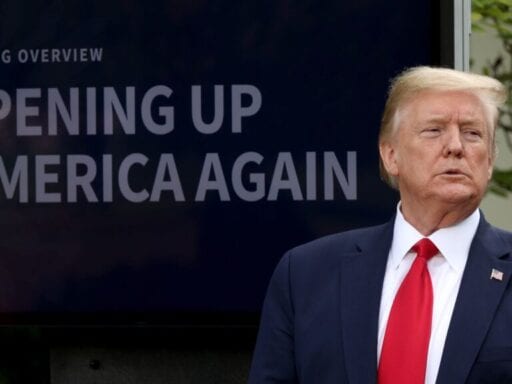The president wants you to believe the deficit was falling before the coronavirus hit. In fact, it increased each year of his presidency.
Though the proceedings were ostensibly about the coronavirus, President Donald Trump used Monday’s press briefing to push a puzzlingly brazen lie about his stewardship of the federal budget — an example of how consistently he just doesn’t tell the truth.
As part of his argument that he oversaw the development of the greatest economy in world history prior to the coronavirus reaching US shores and wrecking things, Trump claimed that “if you look, prior to this virus, the deficit was coming down under my administration.” He said this was due to him putting “massive tariffs on China” — tariffs that resulted in America “taking in tens of billions of dollars” from the country he’s now trying to blame for the pandemic.
Watch:
TRUMP: “If you look, prior to this virus, the deficit was coming down under my administration.” (This is a lie.) pic.twitter.com/cTg5rol4y0
— Aaron Rupar (@atrupar) April 27, 2020
Trump has a long history of telling lies about everything from Obama’s birth certificate to wind turbines causing cancer. But this particular claim about the national deficit still stands out as whopper, even by his impressive standards.
Not only was the deficit not going down pre-coronavirus, but the Congressional Budget Office announced about a week after the first coronavirus case was reported in the country that the deficit would top $1 trillion this year — a feat that has only been previously accomplished in the darkest throes of the Great Recession.
The federal deficit under President Donald Trump will top $1 trillion this year, the Congressional Budget Office announced in its annual fiscal outlook on Tuesday https://t.co/YVNKAw9WQC
— POLITICO (@politico) January 28, 2020
Furthermore, as this graph from a US government website indicates, the deficit has gone up each year under Trump’s presidency — in no small part because of the budget-busting tax cuts for the wealthy that he championed and signed into law in December 2017.
/cdn.vox-cdn.com/uploads/chorus_asset/file/19929409/12.jpg)
Beyond the year-to-year deficits, Trump — who promised on the campaign trail to eliminate the national debt — has overseen new records in the accumulation of debt, which is currently approaching $25 trillion.
It’s also not the case that the US has taken in “tens of billions of dollars” because of tariffs on China. Tariffs are taxes on American importers, not foreign governments. They represent a tax increase. While Trump has told this particular lie about how tariffs work dozens of times, what he doesn’t mention is that the ensuing trade war with China resulted in the federal government forking over more than $22 billion to negatively impacted American farmers last year, creating yet another strain on the national budget.
There was really no reason to have a coronavirus briefing on Monday in the first place
Following Trump’s widely mocked remarks last Thursday about disinfectants as a possible coronavirus miracle cure, the White House initially announced there would be no briefing on Monday. That changed sometime during the day on Monday.
Press Secretary Kayleigh McEnany tweeted that Monday’s briefing would be about “additional testing guidance and other announcements about safely opening up America again,” but in reality it was more about fulfilling Trump’s need for attention.
The early part of the event a parade of CEOs eerily similar to a scene that unfolded at another of Trump’s briefings last month. The Q&A part featured the White House’s familiar misleading spin about the progress of coronavirus testing, as well as efforts by Trump to reframe the likelihood that as many as 70,000 Americans will die from the virus as actually being a reflection of the great job he did handling things. (Nevermind his comments in late February that the virus would go away on its own in miraculous fashion.)
.@Olivianuzzi : If a POTUS loses more Americans over six weeks than died in the Vietnam War, does he deserve to be reelected?
TRUMP: “If you look at what the original projections were, 2.2 million — we’re probably headed to 60,000, 70,000 …we’ve made a lot of good decisions.” pic.twitter.com/J6YzS7jWoz
— Aaron Rupar (@atrupar) April 27, 2020
None of that was particularly new. But Trump’s attempt to turn economic reality on its head with his comments about the national deficit served as a window into how far he’s willing to go to get people to believe that up is down.
Support Vox’s explanatory journalism
Every day at Vox, we aim to answer your most important questions and provide you, and our audience around the world, with information that has the power to save lives. Our mission has never been more vital than it is in this moment: to empower you through understanding. Vox’s work is reaching more people than ever, but our distinctive brand of explanatory journalism takes resources — particularly during a pandemic and an economic downturn. Your financial contribution will not constitute a donation, but it will enable our staff to continue to offer free articles, videos, and podcasts at the quality and volume that this moment requires. Please consider making a contribution to Vox today.
Author: Aaron Rupar
Read More



